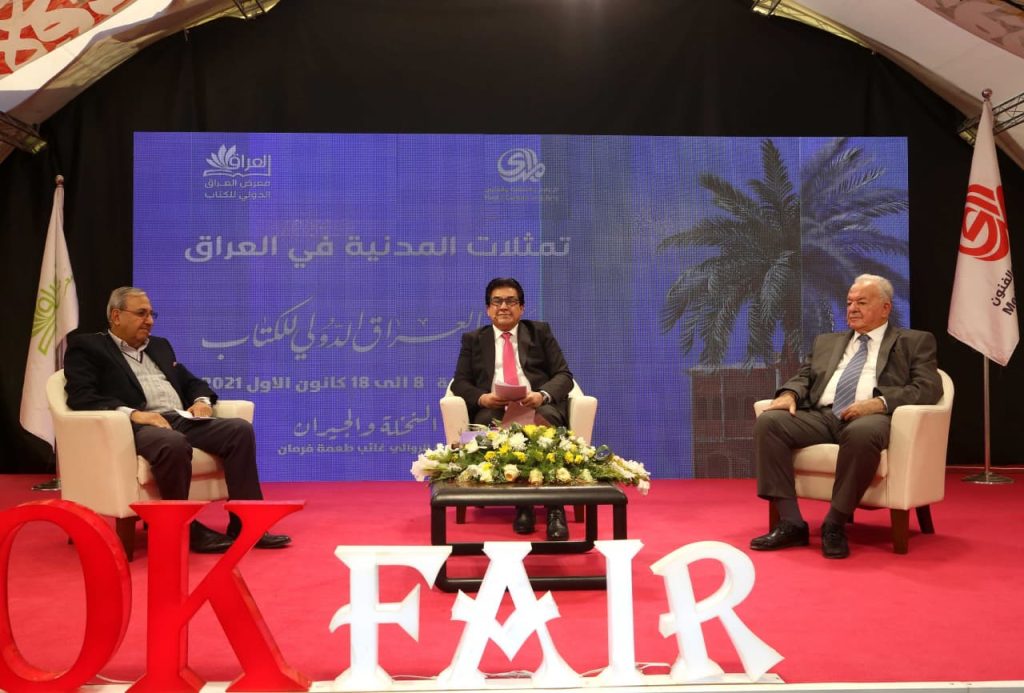
زين يوسف
تصوير : محمود رؤوف
On the seminar hall and within the platform of the Iraq International Book Fair, a seminar was held under the title “Civic Representations in Iraq”, in which Dr. Ahmed Ibrahim and Dr. Ali Al-Rafi’i participated and was moderated by Mr. Asim Jihad.
On the concept of the civil state, Ibrahim Ahmed said, “Perhaps this term has entered new Iraqi society, and even in the political dictionary there is no description of the civil state, but there is talk about civil society, this term remained in people’s minds as an antithesis to the military state until the Arab Spring came, so social mobility in a number of countries raised the slogan of the civil state, and the reasons for this matter are related to the nature of the regimes that came after military coups in the region, whether in Egypt, Tunisia and Libya, which “It provided a bad experience and left a mark on people about a police state, so this slogan was raised as the opposite of the coups that took place at the time.”
He pointed out that “the matter in Iraq is slightly different, in Iraq this slogan was raised in the protests that took place in 2011, as a slogan contrary to what was put forward by the parties that dominated the Iraqi state after 2003.”
Moving on to Dr. Ali Al-Rafi’i, who stressed that “people’s understanding of the civil state is that it is a civilized state, a state that keeps pace with developments at the global level, a country far from fanaticism, this slogan was not in the period of totalitarian rule, some may describe the former regime as a civil system, but certainly not, now the concept of civil is broader than that, the concept of civil has room for freedoms and for the formation of parties and civil society organizations, and these things are related to the concept of civil state, when you ask the simple person what is a civil state, he says You are the opposite of a theocratic state, but in fact it is a state that legally depends on the principle of independence of authorities and the non-overlapping powers of one authority with the powers of another, in addition to the existence of bodies representing the people in addition to elected councils.”
He stressed that “in Iraq in the past, we did not know anything about civil society organizations, as is the case now, in the developed world gives an important role to civil society organizations alongside the government, and this is one of the characteristics of the civil state, also one of its features is respect for religion, separation of religion from the state, non-politicization of religion and non-religiosity of politics.”
In a question about the time of the birth of the concept of civilization in the world or in Iraq, Ahmed Ibrahim replied, “The term civilization basically came from the city and the city always breathes in a broader framework, which is the international community through the acculturation that takes place between the city and its surroundings, especially after the information revolution and the tremendous development in the means of communication, and this matter leaves a distant impact on the local culture.”
He pointed out that civilization is related to fundamental things and the basic rule of the civil state is democracy and freedoms in addition to justice and heaven, and there is also the superstructure related to the civil culture of the people and globalization in its forms that emerge through the differentiation that occurs between the political function of the state and the religious function, and all this framework is the one that forms the structure of the state that continues to become permanent through acculturation with foreign cultures.
To talk about the Iraqi street’s understanding of the civil state, Ali Al-Rafi’i confirms that “the Iraqi citizen understands the civil state as the state that provides him with protection, and the state under which he can express his opinion, and during 35 years this state did not exist, so when this term was put forward, it received a strong response from the Iraqi street as a result of suffering, and the concept of the civil state matures with the passage of days, and I as a legal person talk that the laws in all the world that stipulate that this does not violate public order and morals. To this day, there is no specific definition of the concept of public order, but there is awareness among people that this rule is public order.”
Al-Rafi’i stated that “the first step began with the presence of civil forces that want the future of this country, these steps began with many proposals that received a response at the level of legislation, for example the parties law came because of demands, because the forces that came after 2003 did not have in their calculations the formation of parties and the practice of democracy, but there is a voice for the national forces, and there is an inherited history of the civil national forces in Iraq and this was manifested by the demands previously and at the present time, I imagine that the first steps began and are intended by the people The political history of Iraq proves that Iraq has gone through calamities, but the national voice defending the Iraqi citizen has remained steadfast, yes, the march is faltering, but it will continue.” On achieving social justice, he said that “social justice has now become an important part in the issue of defining the concept of the civil state, because social goals are basic and since there is political democracy, there is social democracy, so social justice is a basic requirement for national forces, and it can be achieved through legislation to achieve a guarantee for the Iraqi citizen.”
